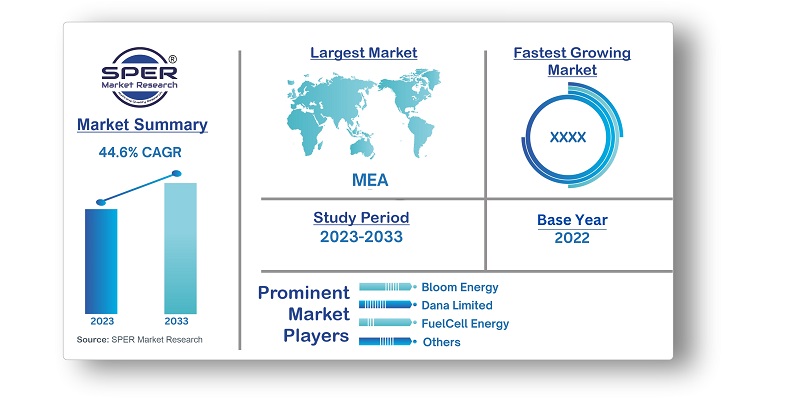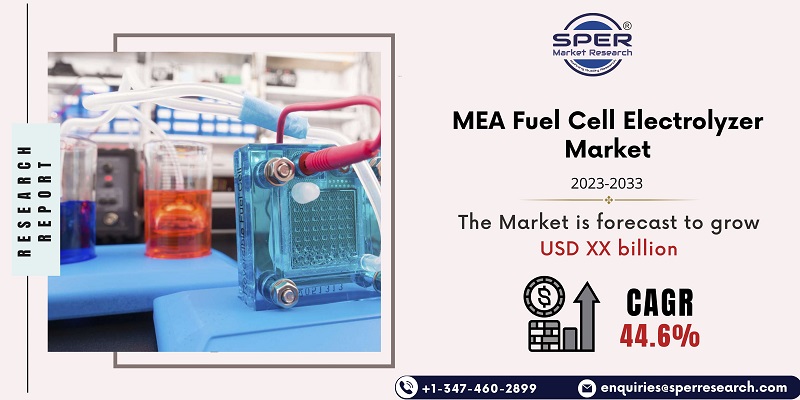
Middle East and Africa Fuel Cell Electrolyzer Market Growth, Size, Trends, Share and Future Outlook
Middle East and Africa Fuel Cell Electrolyzer Market Size- By Product Type, By Application- Regional Outlook, Competitive Strategies and Segment Forecast to 2033
| Published: Jan-2024 | Report ID: POAE2407 | Pages: 1 - 157 | Formats*: |
| Category : Power & Energy | |||
- 2022: A German clean hydrogen technology company called Hydrogen Rise has outlined its plans for an Oman green hydrogen economy. As part of Oman's ambition to creating a domestic hydrogen economy, the business plans to design, construct, and operate a green hydrogen factory near Sohar.


| Report Metric | Details |
| Market size available for years | 2019-2033 |
| Base year considered | 2022 |
| Forecast period | 2023-2033 |
| Segments covered | By Product Type, By Application |
| Regions covered | Egypt, Israel, Saudi Arabia, South Africa, The UAE and Rest of the Middle East & Africa |
| Companies Covered | Bloom Energy, Dana Limited, FuelCell Energy, Hydrogen Rise, INEOS Group, Mitsubishi Heavy Industries Limited, Nel ASA, Nigbo TopCorr Corrosion Technology Co. Ltd., Nuvera Fuel Cells, Plug Power Inc., Others |
- Government and Regulatory Bodies
- Energy Utilities and Companies
- Manufacturers, Suppliers, and Distributors
- Investors in the Energy Sector
- Research and Development Organizations
- Hydrogen Production Industries
- Infrastructure Construction and Implementation
- Academic and Educational Sector
| By Product Type: |
|
| By Application: |
|
| By Region: |
|
- Middle East & Africa Fuel Cell Electrolyzer Market Size (FY’2023-FY’2033)
- Overview of Middle East & Africa Fuel Cell Electrolyzer Market
- Segmentation of Middle East & Africa Fuel Cell Electrolyzer Market By Product Type (Alkaline Electrolyzers, Anion Exchange Membrane, Proton Exchange Membrane, Solid Oxide Electrolyzers, Others)
- Segmentation of Middle East & Africa Fuel Cell Electrolyzer Market By Application (Industrial, Portable Power, Stationary Power, Transportation)
- Statistical Snap of Middle East & Africa Fuel Cell Electrolyzer Market
- Expansion Analysis of Middle East & Africa Fuel Cell Electrolyzer Market
- Problems and Obstacles in Middle East & Africa Fuel Cell Electrolyzer Market
- Competitive Landscape in the Middle East & Africa Fuel Cell Electrolyzer Market
- Impact of COVID-19 and Demonetization on Middle East & Africa Fuel Cell Electrolyzer Market
- Details on Current Investment in Middle East & Africa Fuel Cell Electrolyzer Market
- Competitive Analysis of Middle East & Africa Fuel Cell Electrolyzer Market
- Prominent Players in the Middle East & Africa Fuel Cell Electrolyzer Market
- SWOT Analysis of Middle East & Africa Fuel Cell Electrolyzer Market
- Middle East & Africa Fuel Cell Electrolyzer Market Future Outlook and Projections (FY’2023-FY’2033)
- Recommendations from Analyst
1.1. Scope of the report1.2. Market segment analysis
2.1. Research data source2.1.1. Secondary Data2.1.2. Primary Data2.1.3. SPER’s internal database2.1.4. Premium insight from KOL’s2.2. Market size estimation2.2.1. Top-down and Bottom-up approach2.3. Data triangulation
4.1. Driver, Restraint, Opportunity and Challenges analysis4.1.1. Drivers4.1.2. Restraints4.1.3. Opportunities4.1.4. Challenges4.2. COVID-19 Impacts of the Middle East & Africa Fuel Cell Electrolyzer Market
5.1. SWOT Analysis5.1.1. Strengths5.1.2. Weaknesses5.1.3. Opportunities5.1.4. Threats5.2. PESTEL Analysis5.2.1. Political Landscape5.2.2. Economic Landscape5.2.3. Social Landscape5.2.4. Technological Landscape5.2.5. Environmental Landscape5.2.6. Legal Landscape5.3. PORTER’s Five Forces5.3.1. Bargaining power of suppliers5.3.2. Bargaining power of buyers5.3.3. Threat of Substitute5.3.4. Threat of new entrant5.3.5. Competitive rivalry5.4. Heat Map Analysis
6.1. Middle East & Africa Fuel Cell Electrolyzer Market Manufacturing Base Distribution, Sales Area, Product Type6.2. Mergers & Acquisitions, Partnerships, Product Launch, and Collaboration in Middle East & Africa Fuel Cell Electrolyzer Market
7.1. Middle East & Africa Fuel Cell Electrolyzer Market Value Share and Forecast, By Product Type, 2023-20337.2. Alkaline Electrolyzers7.3. Anion Exchange Membrane7.4. Proton Exchange Membrane7.5. Solid Oxide Electrolyzers7.6. Others
8.1. Middle East & Africa Fuel Cell Electrolyzer Market Value Share and Forecast, By Application, 2023-20338.2. Industrial8.3. Portable Power8.4. Stationary Power8.5. Transportation
9.1. Middle East & Africa Fuel Cell Electrolyzer Market Size and Market Share
10.1. Middle East & Africa Fuel Cell Electrolyzer Market Size and Market Share By Product Type (2019-2026)10.2. Middle East & Africa Fuel Cell Electrolyzer Market Size and Market Share By Product Type (2027-2033)
11.1. Middle East & Africa Fuel Cell Electrolyzer Market Size and Market Share By Application (2019-2026)11.2. Middle East & Africa Fuel Cell Electrolyzer Market Size and Market Share By Application (2027-2033)
12.1. Middle East & Africa Fuel Cell Electrolyzer Market Size and Market Share By Region (2019-2026)12.2. Middle East & Africa Fuel Cell Electrolyzer Market Size and Market Share By Region (2027-2033)12.3. Egypt12.4. Israel12.5. Saudi Arabia12.6. South Africa12.7. The UAE12.8. Rest of the Middle East & Africa
13.1. Bloom Energy13.1.1. Company details13.1.2. Financial outlook13.1.3. Product summary13.1.4. Recent developments13.2. Dana Limited13.2.1. Company details13.2.2. Financial outlook13.2.3. Product summary13.2.4. Recent developments13.3. FuelCell Energy13.3.1. Company details13.3.2. Financial outlook13.3.3. Product summary13.3.4. Recent developments13.4. Hydrogen Rise13.4.1. Company details13.4.2. Financial outlook13.4.3. Product summary13.4.4. Recent developments13.5. INEOS Group13.5.1. Company details13.5.2. Financial outlook13.5.3. Product summary13.5.4. Recent developments13.6. Mitsubishi Heavy Industries Limited13.6.1. Company details13.6.2. Financial outlook13.6.3. Product summary13.6.4. Recent developments13.7. Nel ASA13.7.1. Company details13.7.2. Financial outlook13.7.3. Product summary13.7.4. Recent developments13.8. Nigbo TopCorr Corrosion Technology Co. Ltd.13.8.1. Company details13.8.2. Financial outlook13.8.3. Product summary13.8.4. Recent developments13.9. Nuvera Fuel Cells13.9.1. Company details13.9.2. Financial outlook13.9.3. Product summary13.9.4. Recent developments13.10. Plug Power Inc.13.10.1. Company details13.10.2. Financial outlook13.10.3. Product summary13.10.4. Recent developments13.11. Others
SPER Market Research’s methodology uses great emphasis on primary research to ensure that the market intelligence insights are up to date, reliable and accurate. Primary interviews are done with players involved in each phase of a supply chain to analyze the market forecasting. The secondary research method is used to help you fully understand how the future markets and the spending patterns look likes.
The report is based on in-depth qualitative and quantitative analysis of the Product Market. The quantitative analysis involves the application of various projection and sampling techniques. The qualitative analysis involves primary interviews, surveys, and vendor briefings. The data gathered as a result of these processes are validated through experts opinion. Our research methodology entails an ideal mixture of primary and secondary initiatives.



Frequently Asked Questions About This Report
PLACE AN ORDER
Year End Discount
Sample Report
Pre-Purchase Inquiry
NEED CUSTOMIZATION?
Request CustomizationCALL OR EMAIL US
100% Secure Payment






Related Reports
Our Global Clients
Our data-driven insights have influenced the strategy of 200+ reputed companies across the globe.




















